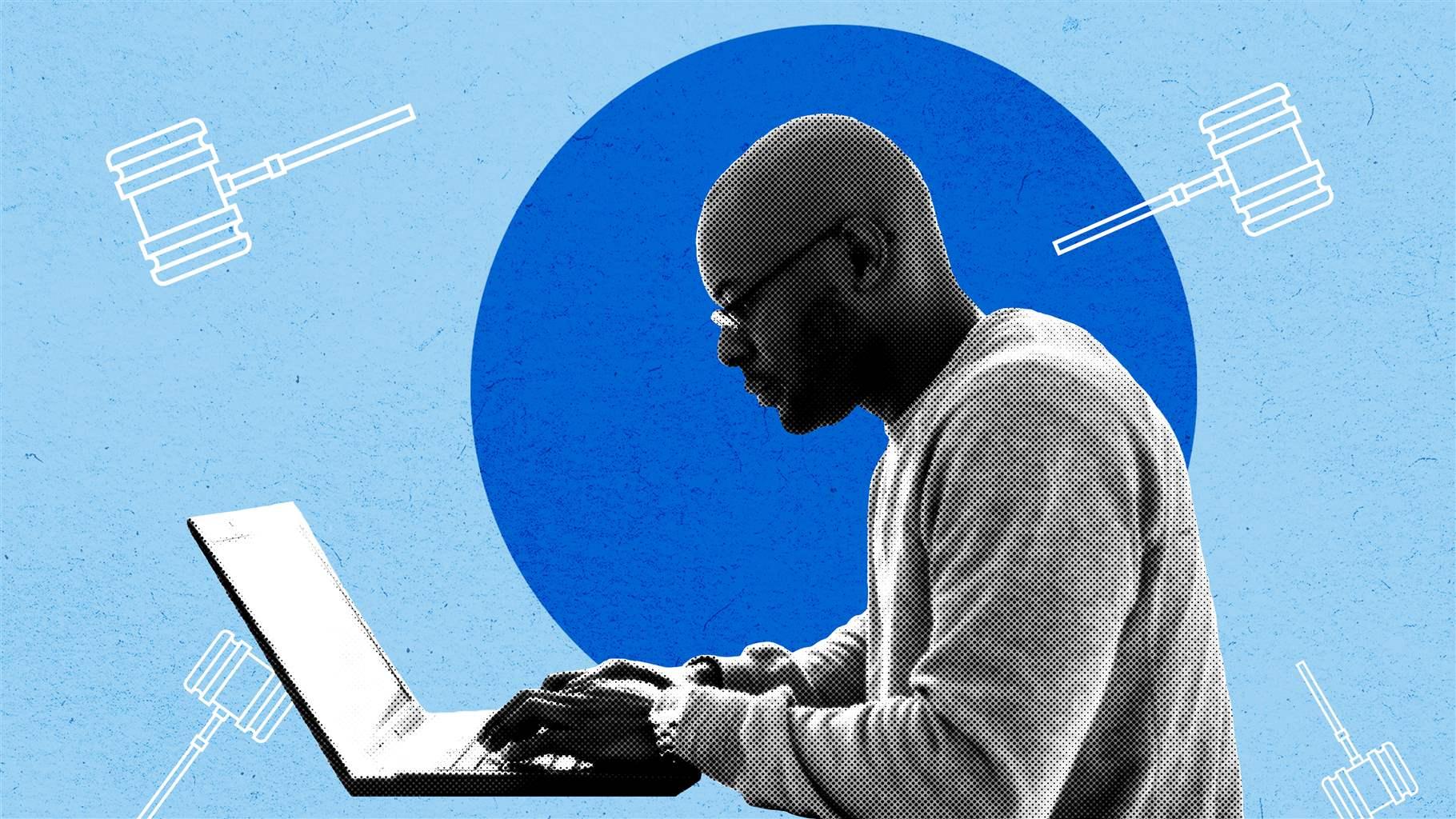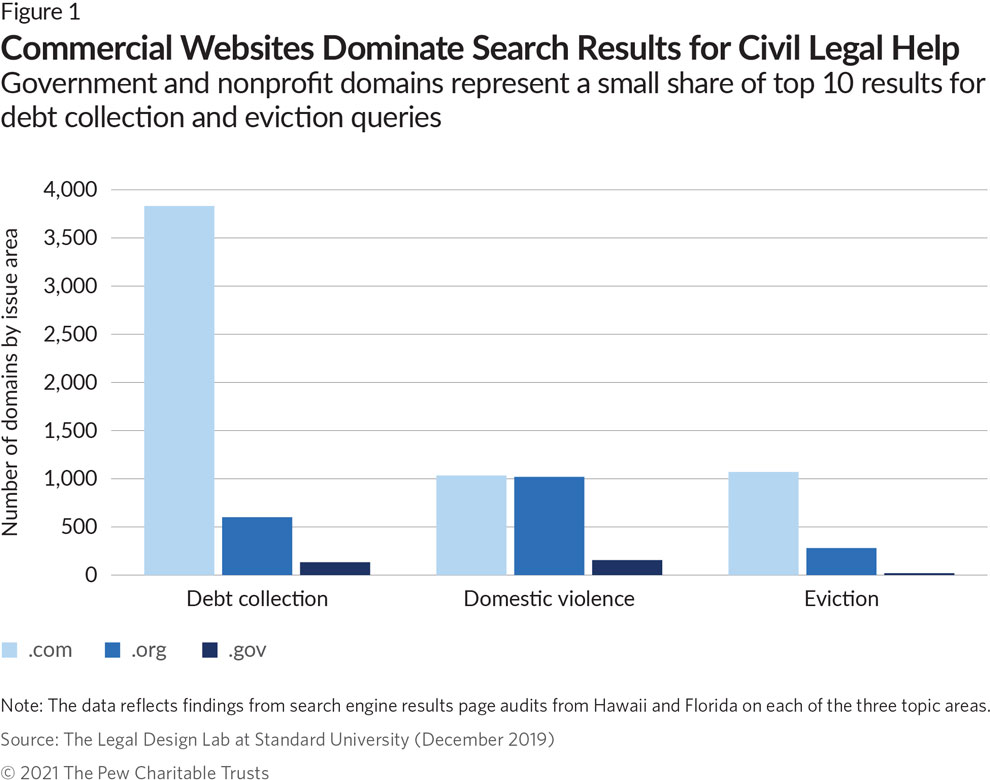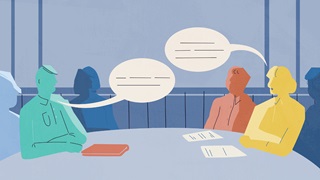Simple Tools Can Boost Access to Online Legal Information
With focus on search engine optimization, civil courts and legal aid providers can help more people find their websites

For many Americans, Google and other search engines are increasingly popular means of finding legal information and resources. People facing civil justice issues—such as housing disputes or consumer debt claims—often do not realize that their problems have implications that require legal remedies. So they turn to the internet, as they would in other situations to find specialized information to solve a problem. Instead of navigating directly to court or legal aid websites, many typically type queries into their browsers. The results don’t always yield relevant, high-quality legal guidance.
Courts and the legal aid community have invested considerable resources in improving their webpages and building state-of-the-art tools to help people research and resolve legal issues online. In the past year and a half, demand for this information skyrocketed as COVID-19 created new civil legal problems and forced offices that provide in-person legal help to close their doors. The key question, though, remains whether those who need legal resources can find them online. And research shows the critical importance of search engine optimization (SEO) to make that happen.
Information hard to find if not near top of search results
Most people searching for information online view only the first page of results and click on one of the top three hits. Too often that does not include accurate, location-specific information from relevant courts and legal services providers.
In 2019, the Legal Design Lab at Stanford University worked with legal aid organizations in Hawaii and Florida to better understand the experiences of people who search for legal information online. The research involved auditing search engine results pages using terms describing common civil issues in language that people without legal knowledge would use. For example, they could look for phrases such as “reasons landlord can evict” or “need advice on creditor judgments.” The team wanted to see whether and where legal aid (.org) or court (.gov) websites ranked on the first page of Google search results for eviction, domestic violence, and debt collection queries.
Researchers found that neither type of website placed high in any of the issue areas compared with commercial sites ending in .com. No court websites made it to the first page of results. In fact, most of the .gov domains that appeared were federal sites, such as usa.gov or hhs.gov, rather than state or jurisdictional pages that contain the local legal information a searcher might need.
Eviction was the one issue area where the states’ legal aid websites appeared in the first page of results. Commercial sites still dominated, showing up almost four times more frequently in eviction searches and roughly six times more often in debt collection queries. Meanwhile, domestic violence proved to be the only issue area for which .org sites appeared more often—albeit slightly—than .com ones.
The top three websites to appear on results pages were nolo.com, usnews.com, and creditcards.com—a commercial legal information and lawyer referral site, a commercial news site, and a commercial financial information site, respectively. Although searches were limited by ZIP code to regions in Florida and Hawaii, no state-specific legal aid sites showed up in the top 10 pages for any issue area.
Local legal subject matter experts in Hawaii and Florida pointed to local legal aid and court pages as the highest quality sources for online legal self-help information on each issue. High-quality content exists, but people who need it cannot find it if Google search terms do not lead them to the most relevant information. Although this data comes from 2019, the pandemic has highlighted how pressing such concerns have become. Many people have struggled to find accurate local information since early 2020 as policies change and new programs, such as eviction diversion, have been implemented across the country.
Improved SEO would help
To increase web traffic, websites must compete for the prime virtual real estate at the top of a search engine results page. The winners tend to be the sites with the most effective search capabilities.
SEO encompasses the use of various tools and techniques to improve the ability of search engines, such as Google or Bing, to process, or “crawl,” a site’s content. Crawling allows search engines to assess the quality of web content and its relevance to search terms, and then to determine where to place a site on a results page.
SEO “may seem like a bit of a geeky subject,” said Dave Guarino, a software engineer and public policy analyst who develops civic websites, but it helps web managers meet the needs of people “as they express them.” Before the pandemic, legal aid websites rarely used SEO to drive traffic to their sites, so it was difficult for them to compete with private legal help sites. Private websites offering legal help or other civic services, such as tax preparation, often curate their content to appear as though their assistance is free but may encourage users to pay for additional services or attorney consultations. In addition, the information they provide can be inaccurate or unverified.
Paying attention to SEO can help courts and legal aid providers improve how their sites appear in searches and increase the likelihood that their content reaches those who need it most. Still, many leaders don’t realize that such fixes can be implemented easily.
J. Singleton manages the website for LawHelpMN.org, a nonprofit that provides civil legal guidance for Minnesota residents. “At the beginning of the pandemic, our team was creating so much great new video and other self-help content in response to increasing legal problems Minnesotans were facing,” Singleton said. “But with our budget only allowing us a few hours a month of web developer time, it was hard to know if all the time and effort we were putting into content creation was paying off and if the right people were able access it.”
Steps can be low-risk, high-reward
Although further evaluation is needed to determine standard interventions that improve SEO for legal help websites, Google Search Console analytics and the Legal Design Lab’s standard website markup language show promise. Sites can improve SEO by taking steps as simple as increasing webpage load speeds by eliminating unnecessary images or drafting content using language that matches how searchers would phrase their legal problems.
In a climate where securing funding and enacting policies can take months or even years, committing to SEO improvements can help boost use of existing online resources with little additional financial commitment. Thoughtful implementation of SEO principles can make it easier for people without lawyers to fine online legal information and improve how they interact with the civil legal system.
Erika Rickard is a project director and Natasha Khwaja is an associate with The Pew Charitable Trusts’ civil legal system modernization project.







